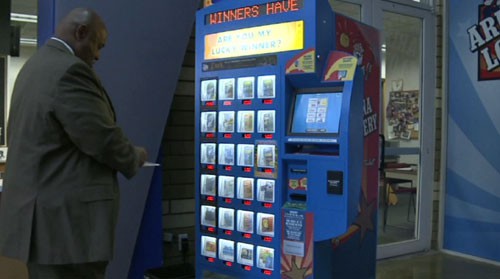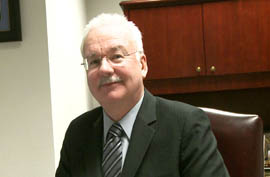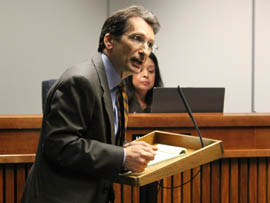Cronkite News has moved to a new home at cronkitenews.azpbs.org. Use this site to search archives from 2011 to May 2015. You can search the new site for current stories.
Lawmaker: Keeping lottery winners’ names private would protect them
PHOENIX – A state lawmaker wants to keep the names of lottery winners private, saying the change would protect them from criminals and scam artists.
Rep. John Kavanagh, R-Fountain Hills, said his inspiration for HB 2082 is Matthew Good, a Fountain Hills resident who split a $587.5 million Powerball jackpot in November.
Lottery officials said Good wished to remain anonymous but released his name in response to a public records request from The Associated Press. By law, the names of Arizona Lottery winners of $600 or more are public record upon request.
“It’s just gossip-type curiosity that only harms the person,” Kavanagh said in an interview. “I think people would be more inclined to enter these events if in fact they knew their names would be confidential and their lives wouldn’t be so disrupted.”
Under Kavanagh’s bill, lottery winners would have the option of waiving anonymity.
Lottery winners’ names are kept private in Delaware, Kansas, Maryland, North Dakota and Ohio, according to the Arizona Lottery.
The House Committee on Government endorsed Kavanagh’s bill on Tuesday by a 7-2 vote, forwarding it to the floor by way of the Rules Committee.
David Bodney, a media attorney and partner with the Phoenix law firm Steptoe & Johnson, told the committee that the change would harm the ability of the news media and citizens to monitor state government.
“If one chooses to participate, and if you’re not prepared to let the public know you won, then don’t play,” he said.
Daniel Barr, an attorney in media law and partner with the Phoenix law firm Perkins Coie, said in an interview that a public enterprise awarding hundreds of millions of dollars of public funds isn’t “gossipy news.”
“Here you have the public interest in knowing who gets the lottery money and how lottery funds are distributed, and that is very high,” he said. “The person’s privacy interest in something they willingly participate in is very low.”
Jeff Hatch-Miller, the Arizona Lottery’s executive director, said in an interview that most winners of prizes large enough to warrant a trip to lottery offices ask that their names not be released.
“We offer them the choice of anonymity or publicity, but most of them are very private people,” he said. “We won’t release any information, and we can’t under law, but we will if requested.”
While he said the Arizona Lottery is officially neutral on the bill, Hatch-Miller added, “I think the players want this bill and most would love to be anonymous.”
Reps. Martin J. Quezada, D-Avondale, and Thomas Forese, R-Gilbert, voted against the bill in committee.
Quezada said many of the concerns Kavanagh raised can be addressed by not playing the lottery.
“I think at the end of the day this is about open government, and I think that we should be striving to ensure that our government is as open as possible,” he said.
Forese said he was worried about how the law may eventually be applied by the Arizona Lottery as well as the idea of managing a government body with anything less than “complete transparency.”
Kavanagh told the committee that there are many other cases in which an individual’s information is kept private, including students, patients and domestic violence victims. Lottery winners deserve the same consideration, he said.
“I’m simply asking that these … souls be spared the public safety problems and the annoyance and harassment problems that come with having their names revealed,” he said.










